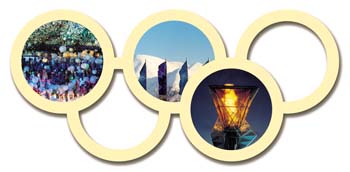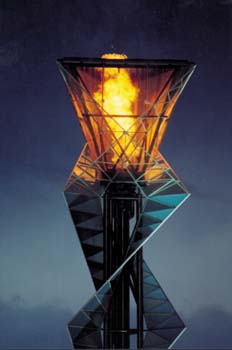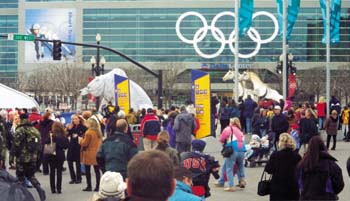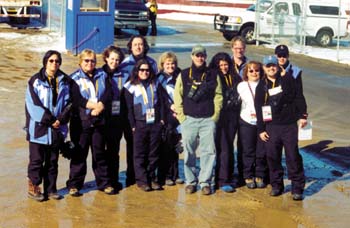
For 17 days, the world watched 2,526 athletes from 77 countries go for the gold in the 19th Winter Olympics staged in Salt Lake City. Americans were filled with pride as U.S. athletes won 34 medals in 10 of 15 sports, far more than the 20 originally hoped for. The 70,000-80,000 people who daily packed the sport venues for a thrill-packed view included some 18,000 volunteers — and among them were six students from Wichita State University.
By Kat Schneider '72

Graduate students Matt Brokaw, Jenny Caulk and Angie Elliott; and undergraduates Jason Fulghum, Gavin Gehrt and Tenille Matzek worked the games as part of their plans of study in sport administration, a field in which students learn how sport-related organizations function regarding event management, public relations, facility management, finance, psychology, legal issues, marketing, management and organizational behavior, sales and sales force management.
The chance to work the 2002 Winter Games was an ultra-unique circumstance, a fact not lost on these students. Gehrt says, “It was just huge to be part of an event of this magnitude.” That golden opportunity came about because last year three members of the sport administration faculty — Greg Comfort, Lori Miller and Clay Stoldt — were at a College Sports Information Directors of America conference to make a presentation. According to Stoldt, assistant professor in the Department of Kinesiology and Sport Studies, “Representatives from the Salt Lake Organizing Committee were there recruiting CoSIDA members to volunteer for the games, and we ended up talking with them about volunteer possibilities for some of our students who were far enough along in their studies to have gained useful experience, training and background.”
Devils and Details
It took several months to work out details, but in the end, “these six from Wichita State became the only group of students from institutions of higher education nationwide that the sloc chose to work with,” says Miller, professor and department chair. Beyond the honor and the nuts-and-bolts experience of seeing how classroom theory plays out in real life, the students gained invaluable insights via exposure to different peoples and cultures. “We were assigned to Utah Olympic Park, which was the busiest venue because it was the site of the ski jumping, bobsled, luge and skeleton competitions,” explains Caulk. Brokaw worked in event communications; Caulk and Matzek, in press operations; Elliott, in event services; Fulghum, in food services; and Gehrt, in accreditation. Brokaw says, “Depending on what was needed each day, we all did a variety of things, so we gained a fairly well-rounded perspective on operations.”
Beyond the immediate experience, it was established up front that the students would earn varying amounts of credit hours counting toward the fulfillment of cooperative education, internship or practicum components of their degree programs. “We had to e-mail weekly journal submissions about what we’d seen, done and learned back to WSU and to each other so we were all up-to-speed,” comments Brokaw. “Let’s just say that some of us were more long-winded than others.”
Alums Step Up
 The six students working the Olympics lived with four area alumni families. “Opportunities like this strengthen bonds among alumni, students and the university,” observes Lori Miller. “That admittedly wasn’t an initial goal, but it did turn into a win-win situation.”
The six students working the Olympics lived with four area alumni families. “Opportunities like this strengthen bonds among alumni, students and the university,” observes Lori Miller. “That admittedly wasn’t an initial goal, but it did turn into a win-win situation.”
WSU’s Cooperative Education Program provided some significant funding to help with expenses the students would incur during their month-long stay in Utah — since “volunteer” in their case translated to “no pay” — and, as always, Wichita State alumni stepped in to help out. Chris Shank ’69, vice president of Wichita’s Dulaney Johnston & Priest and president of the WSU Alumni Association, made a crucial and timely donation to the cause. “And,” says Miller, “we found four alum families living in the Salt Lake City area who were up for the adventure of having total strangers live with them for a month.”
Sherry ’74 and Chris ’75 Carmichael hosted Elliott and Caulk; Donna and Keith ’78 Mercer took on Brokaw and Matzek; Vickie ’75 and Frank Steffey welcomed Fulghum into their home; and Margaret and John ’82 Yancey made room for Gehrt. Summing up the experience, Keith Mercer says, “We pretty much became their parents, providing housing, food and laundry services — but no rules.”
“It was just wonderful having Jason here,” declares Vickie Steffey. “We feel like we contributed in our own small way to the success of the Olympics, and it was great talking with someone from Kansas again.”
However, the Carmichaels arguably had the most memorable experience of the four families; on the evening of Feb. 13 — after Elliott had worked a full shift in great discomfort — medical tent personnel determined that she needed an emergency appendectomy. Sherry Carmichael stepped in as surrogate mother and took care of everything, including keeping Elliott’s family in Wichita informed of the goings-on. “Angie was a good patient, and she was back on the mountain in just a few days so she could put in enough hours to complete her internship,” Carmichael reports. “But it was certainly a little more excitement than we signed up for!”
The Yanceys’ experience was different. “Gavin was the perfect house guest. It seems like we hardly ever saw him,” Margaret Yancey says, laughing. “He would go to work, stop by home, go downtown to play, then come back for two or three hours’ sleep before he went back to work.” Keith Mercer, by his own admission remembering what it was like to be young, asks, “Can you blame them? On any given night downtown, there were 70,000 people living it up at the world’s biggest party.” Free time was especially precious because the students generally worked a 14-hour day on the mountain with hour-long commutes coming and going. Fulghum comments, “I was supposed to work a total of 250 hours for four hours’ credit, but I worked closer to 500 hours, so I’m seriously considering renegotiating the deal.”
Fun and Games
 To complete their requirements for earned credit hours, the six students will give a 40- to 60-minute presentation about their Olympic experience at 6 p.m. Wed., April 17, in the Hughes Metropolitan Complex. Everyone is invited to attend. Photos by Jason Fulghum.
To complete their requirements for earned credit hours, the six students will give a 40- to 60-minute presentation about their Olympic experience at 6 p.m. Wed., April 17, in the Hughes Metropolitan Complex. Everyone is invited to attend. Photos by Jason Fulghum.
Most of the students got to watch practice runs and bits and pieces of several events as they occurred, “uninterrupted by commercials,” jokes Caulk. Elliott enjoyed the ski jumping and luge; Caulk met some of the medal winners during her official duties; Fulghum took in the Swedish-usa hockey game and saw the Jamaican bobsledders — “They were hugely popular and lots of fun” — in training; Brokaw met skeleton gold medalist Jim Shea Jr. — “His was the feel-good story of the Olympics” — and went to six hockey games and the Creed concert; and Gehrt’s Olympic moment was attending the medals ceremony for the men’s half-pipe event, which the U.S. team swept — “Maybe 20,000 people were singing the national anthem and chanting ‘usa usa.’ It was amazing. Then the Foo Fighters came on stage and it got super-rowdy. Wouldn’t have missed it for anything.”
Despite all the intense work and play, everyone agrees there was time enough for talk. Frank Steffey remarks, “We enjoyed the Olympic experience through Jason, which is good, because the locals were warned for weeks how bad the crowds were going to be, so we avoided going to any events, much less downtown.” Elliott, sans appendix, says, “The Carmichaels went way above and beyond. They were really there for me.” Caulk adds, “They were just awesome.” Gehrt declares, “I couldn’t have asked for a better host family,” and Matzek admits she’s going to miss the Mercers, a sentiment they echo.
The Fire Within
After such a once-in-a-lifetime experience, Brokaw says, “Life’s going to be pretty dull, but we’ll get over it.” Elliott, who is interested in a career in event management, remarks, “My Olympics job was so valuable, and I have enough memories to last a lifetime.” Caulk notes, “It was just incredible to be talking to people from all over the world. I learned something from each person I talked with, either something I didn’t know anything about or something more about things I already knew.” Fulghum, who hopes to go into sport business, comments, “I got a good overview of the business side of event management and food services. It was a fantastic first-hand experience in things that never come up in a classroom or textbook.”
Gehrt, who wants to pursue a career in facilities or game-day operations for a major-league baseball team, says, “Actually seeing how an event of this magnitude is run was an experience few besides us six can claim to have had. It really sets us apart.” And Brokaw, who wants to work in game-day operations for either an nhl or nfl team, speaks for all: “To be able to put this experience down on your résumé is awesome. How many applicants can say they worked the biggest sport venue in the world? It was one golden opportunity.”





